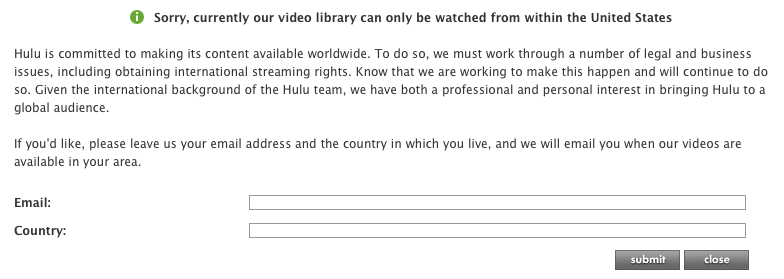Socks and Proxychains as a VPN Alternative
I’ve recently been dabbling with setting up a little homeserver. It runs XBMC, afpd (for TimeMachine) and a good amount of other little scripts and apps that mike my life more automated.
One of the things I would like to have is the ability to access US only services like Hulu from within XBMC.
From the XBMC side, that isn’t all that hard of a task. There are plugins for hulu (video) and the online portfolio of various cable stations (video) available from bluecop’s repository. They certainly aren’t giving the user an experience that is up to par with something like the interface of an Apple TV, but it usually works without too much of a hassle.
One of the problems when setting up this combination is the geo-locked nature of hulu and the other providers. When visiting the Hulu website from my usual German IP address, I am greeted with the usual “NO VIDEO FOR YOU!” message:

To get arround this, I’ve used VPNs or specialized services in the past. While both of them work pretty decently, I’d rather not force ALL of my traffic over the VPN or pay for a service that I can’t use for much more than Hulu.
One solution would be to go down the VPN route and configure network access based on the user or group using iptables’s owner-match extension, but I honestly don’t like working with iptables and the extension isn’t necessarily available on all systems.
Thanks to @makefoo, I looked a bit more into available “socksification” tools. These tools basically hook TCP/IP kernel methods and redirect them over a SOCKS proxy on a per application level using LD_PRELOAD as far as I understood. This means that you can use them on a per-application level and the only thing you need to point them at is a SOCKS proxy. A SOCKS proxy like the one that SSH is able to provide with the -D flag. So the only real setup I have to do is establishing an SSH connection before I launch the app using something like:
ssh -ND 8765 -i /path/to/certificate [email protected]
Given that you set up a ‘user’ account on your server (.bin/false or /bin/nologin are your friends) and have public key authentication enabled, this will open a local socks proxy on port 8765 and is able to dynamically forward all requests ports through that connection. There are several tools that can do the actual redirection of the network requests. I personally have had good luck with ProxyChains. Other alternatives are TSocks or Dante.
Another big advantage is that this doesn’t need anything running on the remote server besides SSH. I suggest looking at current LowEndBox offers for a cheap VPS. I currently use the “Atlanta OpenVZ VPS - OVZ128” from Quickpacket which comes down to 15 USD a year. I had to ask them for another IP once because the first one wasn’t for some reason detected as being from the US, but besides that it worked great.
If you’re looking for solutions to proxy your Bittorrent traffic, I suggest using Deluge Torrent which supports SOCKS without the need for forced socksification. And at least for Germany, Oderland is a nice swedish VPS provider that has a VPS starting at 2-3 Euros/month.
Thanks to this, I can now do all of my backups straight over my regular connetion and specific programs will use the SSH encryted connection. With my AMD E-450 CPU, I can push 100 mbit/s transfer speed to the internet without a problem.